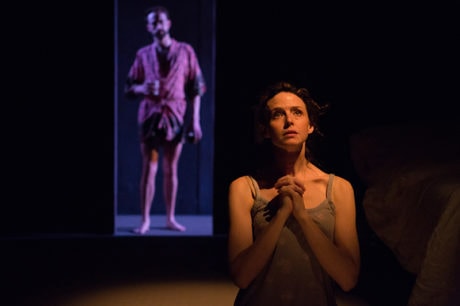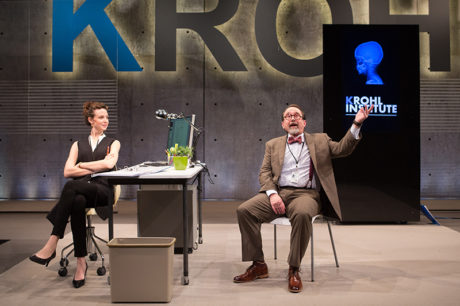I love when a play starts out as a fascinating head trip—a smart, high-concept exhilaration of ideas—then propels me headlong into an overwhelming flood of emotion. It’s like being transported along a neural pathway from brain to heart that the playwright has turned into a thoroughfare of theatrical euphoria.
Tom Stoppard scripts that extraordinary excursion with his new play The Hard Problem, now in an exquisitely scintillating and astonishingly affecting production directed by Matt Torney at Studio Theatre.

What knocked me out about the play is that the central conflict in it is entirely ideational. Quite literally, Stoppard started with years of reading in the fields of brain science, quantitative analysis, behavioral research, game theory, and such. Then with his trademark alchemy he created characters and story lines to put on stage a dramatic distillation of what captured Stoppard’s curiosity to begin with—a conceptual question that may be humanity’s ultimate brain teaser: What is consciousness? How does it come about? Where does it come from and where does it reside?
To wit: Are we merely material mortals who run through our paces like lab rats and make solely self-interested choices like supercomputers sheerly on the basis of cost-benefit calculations?
Or rather: Is there, exterior to our gray matter, something we call a mind or a soul or a consciousness that may somehow cathect with nonmaterial transcendence (aka godness) such that we may be inspired to altruism (aka goodness) that is inexplicable as self-interest?
That is the hard problem to which Stoppard’s title refers and that his characters give voice to. And as they do, throughout the play, it’s brilliant listening. Pithy formulations of the riddle burst like popcorn kernels on a hot griddle. Just as you want to gobble one another comes along.
The central character Hilary (Tessa Klein), for instance, is a whip-smart psychology grad who gets a job at the Krohl Institute for Brain Science and says her prayers every night before bed. In her words,
The study of the mind is not a science. We’re dealing in
mind stuff that doesn’t show up in a scan – accountability,
duty, freewill, language, all the stuff that makes behaviour
unpredictable.
When her colleague Amal (Shravan Amin) tells her, “There is overwhelming evidence that the brain causes consciousness,” Hilary retorts,
There’s overwhelming evidence that brain activity
correlates with consciousness. Registers consciousness.
Nobody’s got anywhere trying to show how the brain is
conscious.
Leo (Martin Giles), Hilary’s boss, puts the problem in this nutshell:
Cognition – reasoning, imagining, believing . . . that’s
hard. How does the brain do self-consciousness? . . . Where is it happening? How?
Meanwhile, Spike (Kyle Cameron), Hilary’s tutor and sometime bedmate, avers the mind-is-matter view:
Culture, empathy, faith, hope and charity, all the flipsides
of egoism, come back to biology, because there just
ain’t anywhere else to come from except three pounds
of grey matter wired up in your head like a map of the
London Underground with eighty-six billion stations
connected thirty trillion ways, hard-wired for me first.

The scientific/philosophical/religious conundrum at the core of The Hard Problem is as much its plot driver as an inciting action would be in some other play. From that central conflict Stoppard sets in motion a through line for his main character that touches upon each hot spot of the argument—then wraps up at the end with a revelation and a resolution that profoundly transcend all the contention. All of this makes viewing The Hard Problem a peak theatergoing experience: You’re taking on board the ongoing debate even as you’re tracking the characters swept along in it. And you’re having a left-brain/right-brain adventure that’s sublimely mind-blowing.
Running Time: One hour and 45 minutes, with no intermission.
The Hard Problem plays through February 19, 2017, at The Studio Theatre – 1501 14th Street, NW, in Washington, DC. For tickets call the box office at (202) 332-3300, or purchase them online.
LINKS:
The Hard Problem at The Studio Theatre reviewed by Amy Kotkin.
In the Moment: The Studio Theatre’s The Hard Problem by David Siegel.
Magic Time! The Hard Problem at The Studio Theatre by John Stoltenberg.





